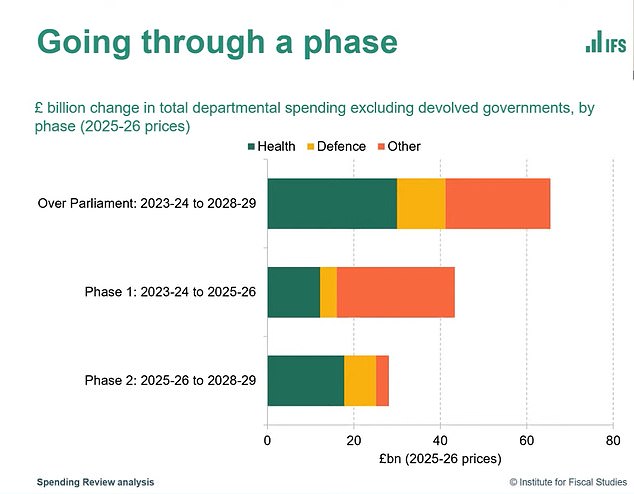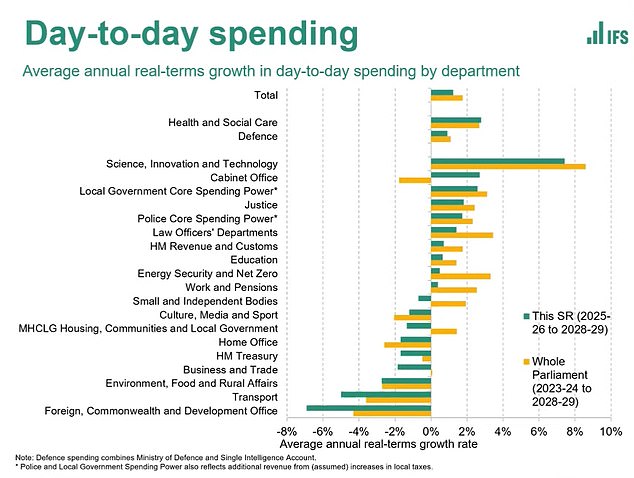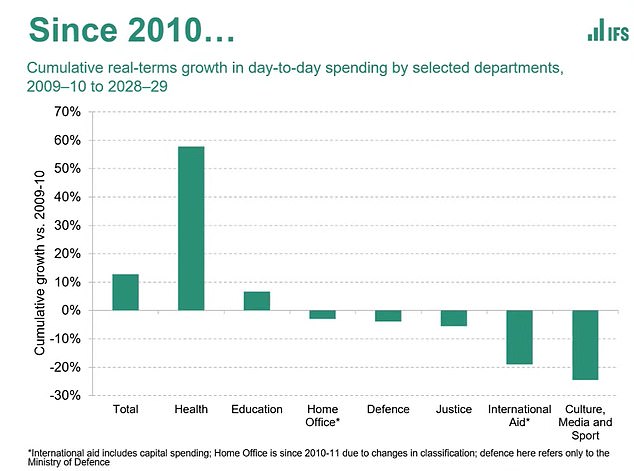The IFS delivered a withering assessment of Rachel Reeves‘ spending plans today warning that tax rises look ‘almost inevitable’.
The think-tank’s director Paul Johnson said he would be ‘very surprised indeed’ if heath and defence funding did not need topping up before the next election.
Despite Labour‘s splurge, he also cautioned that schools spending looked extremely ‘tight’ as special needs provision demand grows.
The IFS’s post-mortem of yesterday’s Spending Review also ridiculed the government’s claim to have identified billions of pounds in ‘efficiencies’ during a ‘zero-based’ overhaul of costs.
Mr Johnson pointed out that all departments had been pencilled in for exactly the same percentages of back-office cuts, suggesting it was not a ‘serious’ exercise.
He said the Chancellor’s speech in the Commons was ‘baffling’ and she did not seem to be trying to ‘provide any useful information to anybody’.
‘Ms Reeves is now going to have all her fingers and all her toes crossed, hoping that the OBR will not be downgrading their forecasts in the Autumn,’ he said.
‘With spending plans set, and ‘ironclad’ fiscal rules being met by gnat’s whisker, any move in the wrong direction will almost certainly spark more tax rises.’

IFS director Paul Johnson said he would be ‘very surprised indeed’ if heath and defence funding did not need topping up before the next election

Despite Labour ‘s splurge, the IFS cautioned that schools spending looked extremely ‘tight’ as special needs provision demand grows

Mr Johnson pointed out that all departments had been pencilled in for exactly the same percentages of back-office cuts, suggesting it was not a ‘serious’ exercise
In the Spending Review yesterday, Ms Reeves set out plans to ‘invest’ a staggering £4trillion to fund ‘the renewal of Britain’.
She said the plans, which include another huge dollop of cash for the NHS, would end the ‘destructive’ austerity of the last government and boost economic growth.
Labour strategists hope the costly gamble will pay off by cutting hospital waiting lists, improving the creaking infrastructure and pump-priming the economy.
However, Ms Reeves’ plans were immediately thrown into chaos today after figures showed the economy tumbling into the red.
GDP was down 0.3 per cent in April, worse than analysts had expected, and raising more questions about the realism of the Chancellor’s splurge on services.
Although UK plc has still grown over the past three months, evidence has been mounting of a slowdown. Ms Reeves admitted the data – which coincide with the huge national insurance tax raid on businesses taking effect – were ‘disappointing’.
In a round of broadcast interviews, she pointed the finger at ‘uncertainty’ surrounding Donald Trump‘s trade tariffs.
But Ms Reeves again avoided ruling out more tax increases at the Autumn Budget, instead arguing that the plans she laid out yesterday – based on healthier economic forecasts – were ‘fully funded’.
‘The world is very uncertain at the moment so I am not going to write Budgets for the future,’ she told Sky News.
At the IFS briefing this morning, Mr Johnson said: ‘Health spending nearly always gets topped up. Growth of 3 per cent a year is below the historic average.
‘It may not even prove enough to fund the official workforce plan and it is at best marginal whether it will be enough to achieve the government’s waiting list targets.
‘Defence spending is rising to 2.5 per cent of national income by 2027, but no increase thereafter.
‘Given external demands and government promises to get it to 3 per cent of GDP at an unspecified date in the next parliament there will be pressure to increase it further. And that’s before any increase in the NATO spending target to more like 3.5 per cent, which this government would presumably feel under some obligation to move towards.’
Turning to the education budget, Mr Johnson highlighted that outside of extra spending on free school meals it is ‘essentially flat in real terms’.
‘Falling pupil numbers should give some room for manoeuvre and result in a modest real increase in per pupil funding, but absent some serious cost-saving reforms, ever growing spending on special educational needs is likely to swallow much – or perhaps all – of that funding growth,’ he said.

A longer view underlined the extraordinary growth in NHS funding over the past 15 years
The IFS also sounded alarm about the prospect for unions to force more bumper pay hikes out of Labour.
‘With day-to-day budgets growing so slowly there is not going to be much room for further significant increases in public sector pay,’ Mr Johnson said.
‘Perhaps last year’s increases followed by a period of rises broadly in line with inflation will be enough to keep peace with the unions, and to recruit and retain as necessary. If not there could be trouble ahead.’
He also raised doubts about the Home Office’s ability to end spending on asylum hotels, and said the Treasury’s reserve has been ‘pared right back’. That left ‘little space to deal with unforeseen pressures’.












